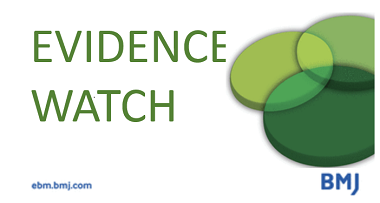Oxygen and stroke is an example of too much medicine that has been shown from the results of a randomised trial
Carl Heneghan

There seem to be a plethora of trials recently on Oxygen. I blogged about its use here in MI, and we published in BMJ EBM in patients without hypoxia in ST elevation MI oxygen increases myocardial injury and infarct size.
Low oxygen saturations are common after stroke and its use has been shown to be associated with worse outcomes. Therefore, you’d think that giving oxygen would help and prevent further brain damage in those with stroke.
A UK randomised trial assessed whether low-dose oxygen in 8,003 acute stroke patients recently admitted to hospital, who were not severely hypoxic, found that while supplementation did increase oxygen saturations, it made no difference in terms of the primary outcome of disability between those given continuous, nocturnal or no oxygen.
In 1999, a quasi-randomised trial design in 292 stroke patients in Norway concluded that supplemental oxygen should not routinely be given to non-hypoxic stroke victims with minor or moderate strokes. Why, then, has it taken nearly 20 years to answer this question?
The lack of effect also shows why we need many more randomised trials for essential practices where there is uncertainty, and why you shouldn’t use observational studies to inform practice: A 2010 retrospective cohort study among 1,487 stroke patients identified three processes of care that were independently associated with improvements in outcomes: one of these three was treating all episodes of hypoxia with supplemental oxygen.
We now know not to use oxygen in those with heart attack or stroke who are not hypoxic (I didn’t know this when I left medical school). What next then for oxygen and too much medicine?
References
Routine low-dose continuous or nocturnal oxygen for people with acute stroke: Three-arm stroke oxygen supplementation RCT. Roffe C. et al. 2018. Health Technology Assessment , 22(14).
Should stroke victims routinely receive supplemental oxygen? A quasi-randomized controlled trial. Rønning OM, Guldvog B. Stroke. 1999 Oct;30(10):2033-7.
Processes of care associated with acute stroke outcomes. Bravata DM, et al. (2010)Arch Intern Med 170 9: 804–810.

BMJ Evidence-Based Medicine – original evidence-based research, insights and opinion
Read more about BMJ EBM content in the Welcome to BMJ Evidence-Based Medicine Editorial.
Competing interests
Carl has received expenses and fees for his media work including BBC Inside Health. He holds grant funding from the NIHR, the NIHR School of Primary Care Research, The NIHR Oxford BRC and the WHO. He has also received income from the publication of a series of toolkit books. CEBM jointly runs the EvidenceLive Conference with the BMJ and the Overdiagnosis Conference with some international partners which are based on a non-profit model.